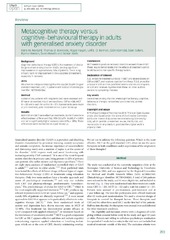Metacognitive therapy versus cognitive–behavioural therapy in adults with generalised anxiety disorder
Nordahl, Hans Morten; Borkovec, Thomas D; Hagen, Roger; Kennair, Leif Edward Ottesen; Hjemdal, Odin; Solem, Stian; Hansen, Bjarne; Haseth, Svein; Wells, Adrian
Peer reviewed, Journal article
Published version

Åpne
Permanent lenke
https://hdl.handle.net/1956/19716Utgivelsesdato
2018Metadata
Vis full innførselSamlinger
Originalversjon
https://doi.org/10.1192/bjo.2018.54Sammendrag
Background: Cognitive–behavioural therapy (CBT) is the treatment of choice for generalised anxiety disorder (GAD), yielding significant improvements in approximately 50% of patients. There is significant room for improvement in the outcomes of treatment, especially in recovery. Aims: We aimed to compare metacognitive therapy (MCT) with the gold standard treatment, CBT, in patients with GAD (clinicaltrials.gov identifier: NCT00426426). Method: A total of 246 patients with long-term GAD were assessed and 81 were randomised into three conditions: CBT (n = 28), MCT (n = 32) and a wait-list control (n = 21). Assessments were made at pre-treatment, post-treatment and at 2 year follow-up. Results: Both CBT and MCT were effective treatments, but MCT was more effective (mean difference 9.762, 95% CI 2.679–16.845, P = 0.004) and led to significantly higher recovery rates (65% v. 38%). These differences were maintained at 2 year follow-up. Conclusions: MCT seems to produce recovery rates that exceed those of CBT. These results demonstrate that the effects of treatment cannot be attributed to non-specific therapy factors.
